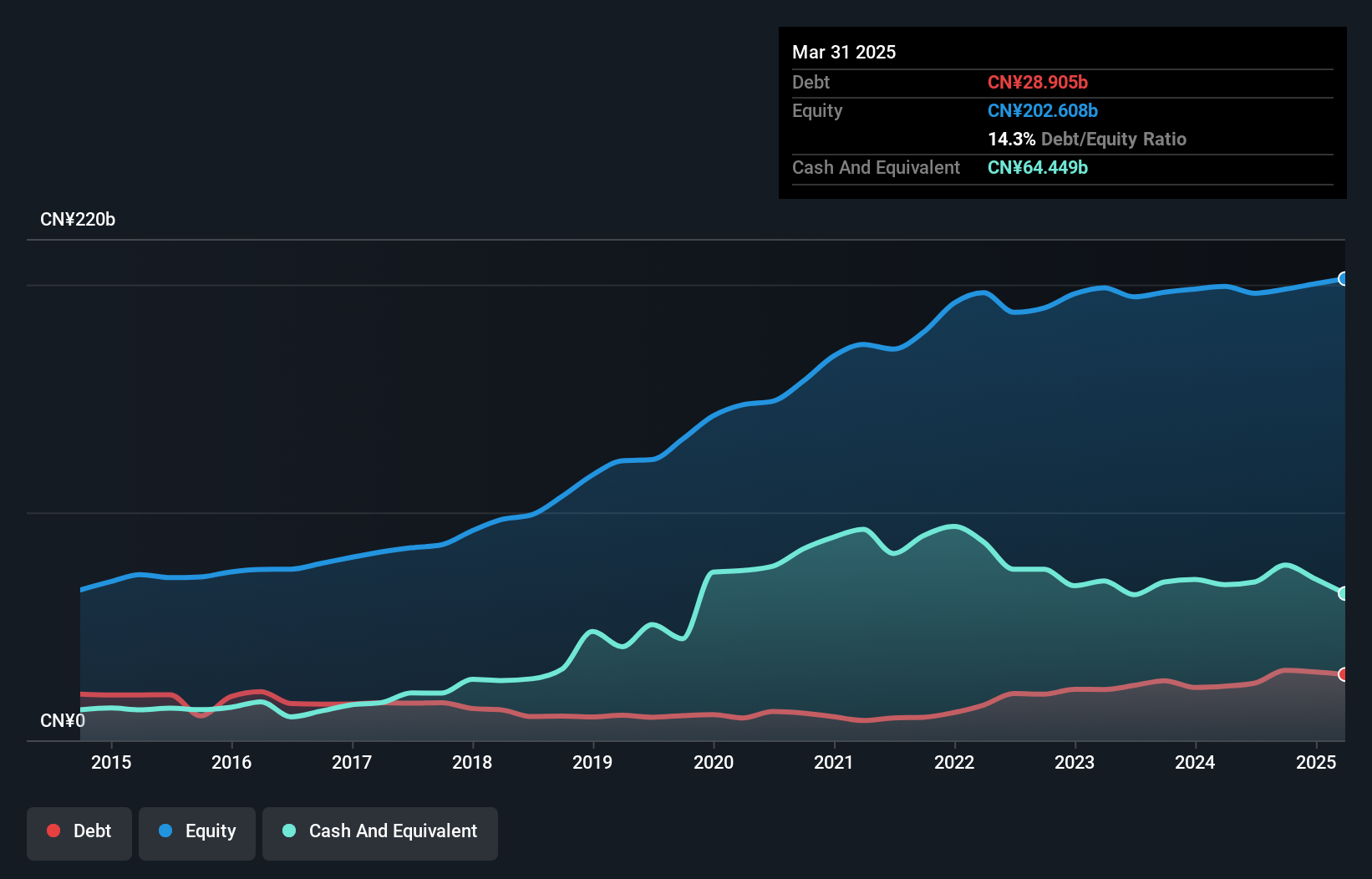The external fund manager backed by Berkshire Hathaway's Charlie Munger, Li Lu, makes no bones about it when he says 'The biggest investment risk is not the volatility of prices, but whether you will suffer a permanent loss of capital.' When we think about how risky a company is, we always like to look at its use of debt, since debt overload can lead to ruin. Importantly, Anhui Conch Cement Company Limited (HKG:914) does carry debt. But should shareholders be worried about its use of debt?
What Risk Does Debt Bring?
Debt is a tool to help businesses grow, but if a business is incapable of paying off its lenders, then it exists at their mercy. Ultimately, if the company can't fulfill its legal obligations to repay debt, shareholders could walk away with nothing. However, a more usual (but still expensive) situation is where a company must dilute shareholders at a cheap share price simply to get debt under control. Of course, debt can be an important tool in businesses, particularly capital heavy businesses. The first thing to do when considering how much debt a business uses is to look at its cash and debt together.
What Is Anhui Conch Cement's Debt?
As you can see below, at the end of March 2025, Anhui Conch Cement had CN¥28.9b of debt, up from CN¥23.7b a year ago. Click the image for more detail. However, its balance sheet shows it holds CN¥64.4b in cash, so it actually has CN¥35.5b net cash.

How Strong Is Anhui Conch Cement's Balance Sheet?
We can see from the most recent balance sheet that Anhui Conch Cement had liabilities of CN¥26.0b falling due within a year, and liabilities of CN¥26.2b due beyond that. On the other hand, it had cash of CN¥64.4b and CN¥14.4b worth of receivables due within a year. So it can boast CN¥26.7b more liquid assets than total liabilities.
It's good to see that Anhui Conch Cement has plenty of liquidity on its balance sheet, suggesting conservative management of liabilities. Given it has easily adequate short term liquidity, we don't think it will have any issues with its lenders. Succinctly put, Anhui Conch Cement boasts net cash, so it's fair to say it does not have a heavy debt load!
View our latest analysis for Anhui Conch Cement
But the bad news is that Anhui Conch Cement has seen its EBIT plunge 17% in the last twelve months. We think hat kind of performance, if repeated frequently, could well lead to difficulties for the stock. When analysing debt levels, the balance sheet is the obvious place to start. But ultimately the future profitability of the business will decide if Anhui Conch Cement can strengthen its balance sheet over time. So if you're focused on the future you can check out this free report showing analyst profit forecasts.
Finally, a business needs free cash flow to pay off debt; accounting profits just don't cut it. While Anhui Conch Cement has net cash on its balance sheet, it's still worth taking a look at its ability to convert earnings before interest and tax (EBIT) to free cash flow, to help us understand how quickly it is building (or eroding) that cash balance. Considering the last three years, Anhui Conch Cement actually recorded a cash outflow, overall. Debt is usually more expensive, and almost always more risky in the hands of a company with negative free cash flow. Shareholders ought to hope for an improvement.
Summing Up
While we empathize with investors who find debt concerning, you should keep in mind that Anhui Conch Cement has net cash of CN¥35.5b, as well as more liquid assets than liabilities. So we don't have any problem with Anhui Conch Cement's use of debt. There's no doubt that we learn most about debt from the balance sheet. However, not all investment risk resides within the balance sheet - far from it. Be aware that Anhui Conch Cement is showing 1 warning sign in our investment analysis , you should know about...
If you're interested in investing in businesses that can grow profits without the burden of debt, then check out this free list of growing businesses that have net cash on the balance sheet.
New: Manage All Your Stock Portfolios in One Place
We've created the ultimate portfolio companion for stock investors, and it's free.
• Connect an unlimited number of Portfolios and see your total in one currency
• Be alerted to new Warning Signs or Risks via email or mobile
• Track the Fair Value of your stocks
Have feedback on this article? Concerned about the content? Get in touch with us directly. Alternatively, email editorial-team (at) simplywallst.com.
This article by Simply Wall St is general in nature. We provide commentary based on historical data and analyst forecasts only using an unbiased methodology and our articles are not intended to be financial advice. It does not constitute a recommendation to buy or sell any stock, and does not take account of your objectives, or your financial situation. We aim to bring you long-term focused analysis driven by fundamental data. Note that our analysis may not factor in the latest price-sensitive company announcements or qualitative material. Simply Wall St has no position in any stocks mentioned.
About SEHK:914
Anhui Conch Cement
Manufactures, sells, and trades in clinker and cement products in China and internationally.
Excellent balance sheet with proven track record.
Similar Companies
Market Insights
Community Narratives



